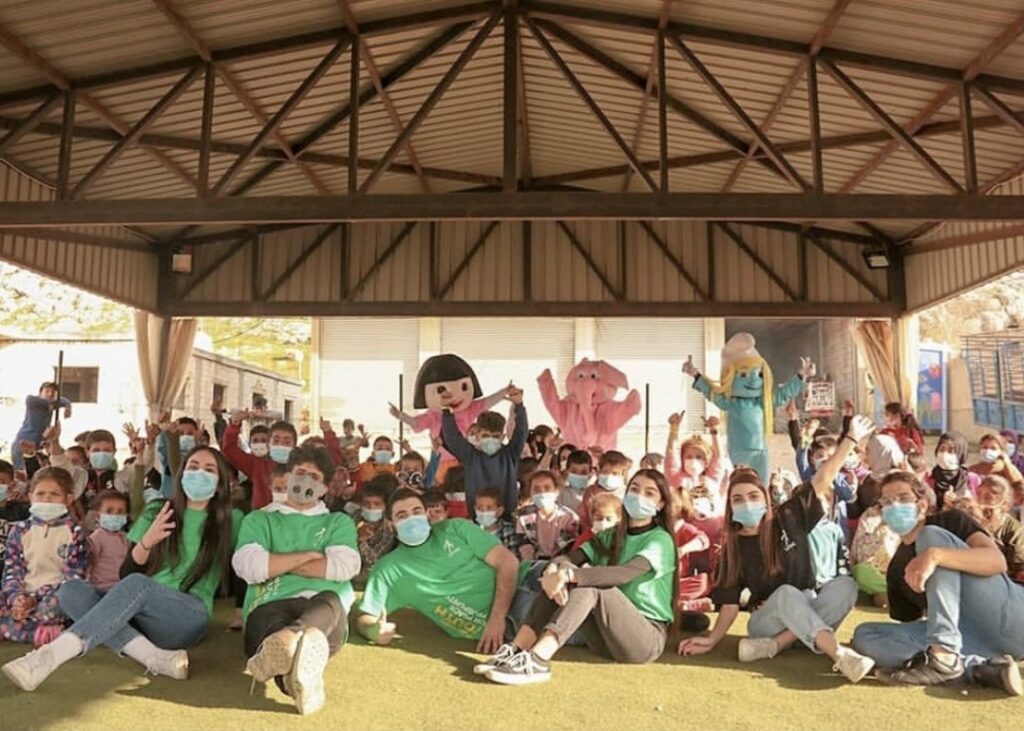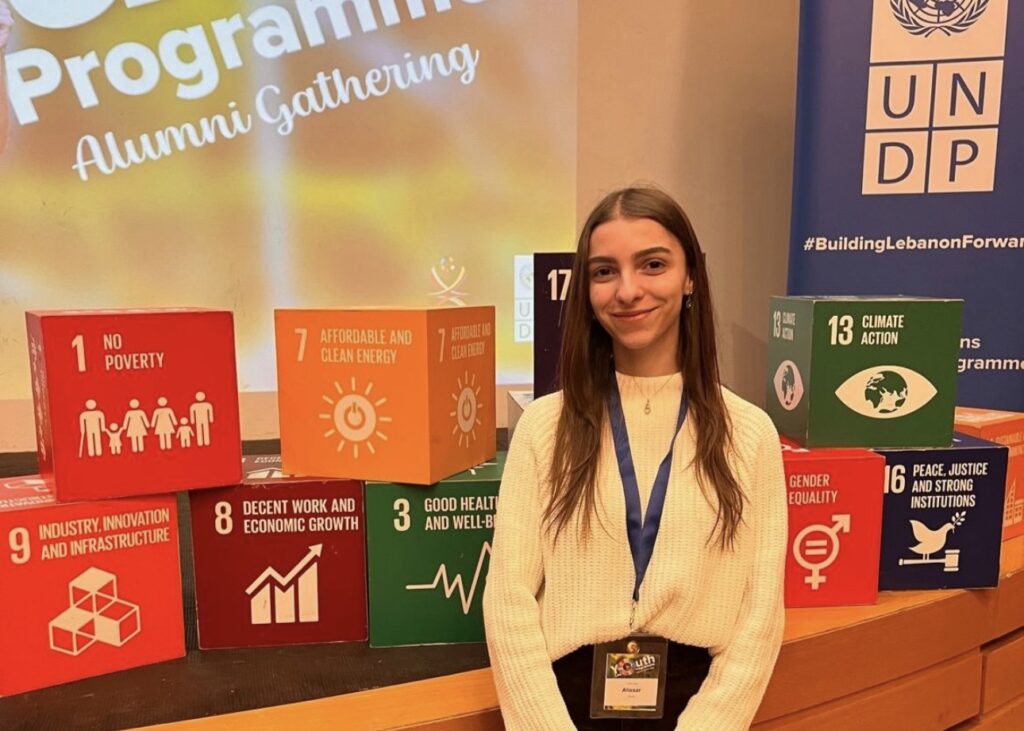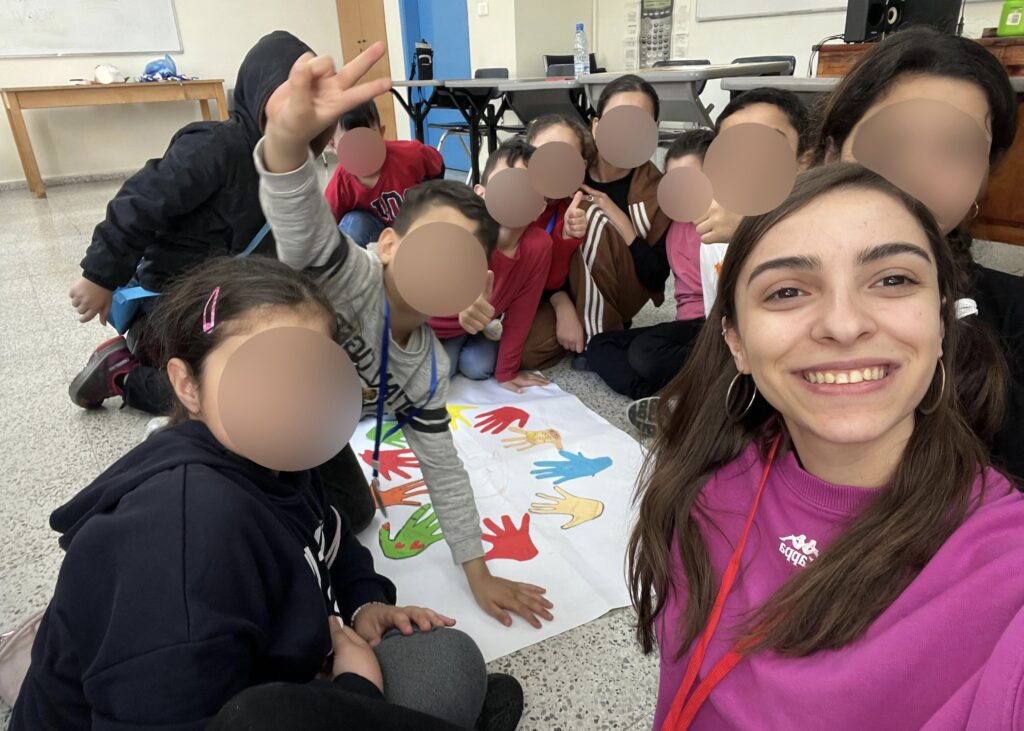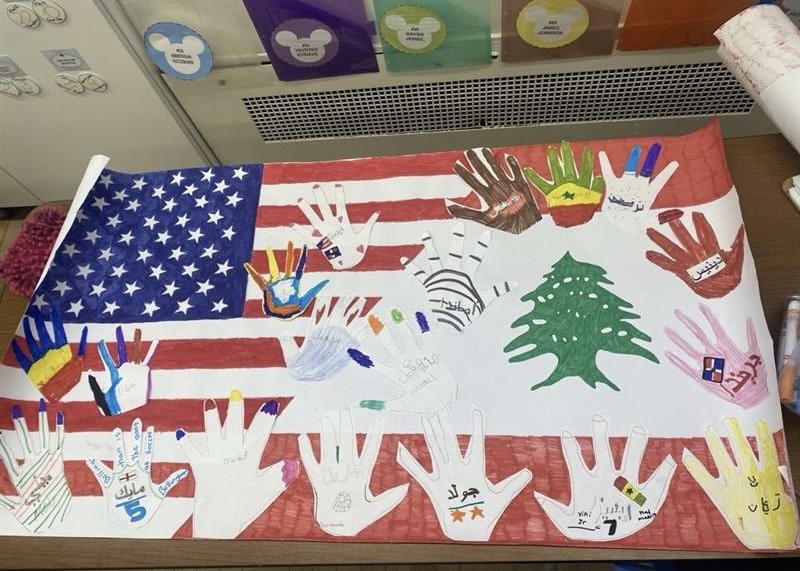Here is the latter half of Alissar’s story!
(If you missed it, you can read the first half of the story here: [Link])
Support the founder to implement Aflatoun nationwide.
The Ups and Downs of Making a Difference
You’ve been involved in a variety of volunteering activities and made significant contributions. What do you find most fascinating about your work as a human rights activist and educator?
For me, it’s always about the people. Every opportunity, volunteer program, and project connects me with new communities and individuals from different backgrounds and experiences. What always fascinates me is seeing how people live in such different ways and navigate difficult challenges in their daily lives. It broadens your perspective and gives you a much wider view of the world. Moreover, it makes you realize how privileged you are, and I feel incredibly grateful to work alongside such resilient people, contributing my time, knowledge, and skills.
Another thing that truly inspires me is how strong and hopeful they are. Whether they are refugees, underprivileged, or struggling in various ways, they continue to give me more inspiration and strength. This makes me want to do even more of the work I’m doing.
Did you always enjoy meeting people, or did this interest develop at a certain age?
I’ve always had a passion for community service and helping others, but it’s been a gradual process. When I was 15, I began getting involved in the volunteer community. My first major experience was with the Lebanese Red Cross, where I met many people working in the humanitarian field. They introduced me to various opportunities, NGOs, and individuals dedicated to social causes. That’s when I became more aware of these spaces and wanted to participate further.
At the same time, I volunteered with a community club where we organized charity events, visited elderly homes and orphanages, and ran winter donation drives for clothes and food. These experiences happened in parallel, giving me significant exposure from a young age, and that exposure continued to grow as I got older.

On the contrast, what do you find most challenging about your work?
As an activist and humanitarian worker, one of the biggest challenges is finding the right cause and the right projects to work with. But even more than that, it’s about how to make these projects effective, especially when resources are limited. You can have the best ideas, the most passionate people, and a great organization, but without enough funding or resources, your impact is limited. It’s tough to see the massive needs but only be able to do so much. We work with what we have, but resources are always a challenge.
Could you tell me which aspects of resources are the most challenging?
In Lebanon, we mostly depend on volunteers, and financial resources remain one of the biggest challenges. That said, one of the beautiful things about the country is its strong culture of volunteerism. When help is needed, you can often call on friends, relatives, or even someone you know from school to step in and contribute. Most organizations rely heavily on this network of volunteers, as they don’t always have the resources to pay staff. However, it can be difficult when specialized expertise is required, as those skills are harder to find. Fortunately, there’s a good network of organizations in Lebanon that exchange resources and knowledge to help address these gaps.
That’s such an amazing culture. How does the community respond in times of crisis?
The community’s response is always remarkable. For example, after the Beirut explosion in August 2020, the damage was so massive that people just went into action. No one called for it, but they went out into the streets with brooms, gloves, and bags, helping clean up and support people in need. It was a spontaneous, collective response. This is what social work and humanitarian work are all about: coming together as a community to help one another.
The Next Step of My Journey: To Make a Bigger Impact
You’ve been involved in various activities, and now you’re studying for your master’s degree in New York. What made you decide to pursue a master’s program?
After completing my bachelor’s degree, I started working with the United Nations in Lebanon, where I worked for two years with the United Nations Development Programme (UNDP). During that time, I saw many talented individuals making a real impact, which motivated me to further my education and deepen my expertise.
During my first year at UNDP, I began exploring scholarships to pursue a master’s degree. I applied for the Fulbright Scholarship, went through a long selection process, and was fortunately accepted. Now, I’m studying in New York and plan to return to Lebanon after completing my master’s degree in two years.
Before entering university, you were working at the United Nations. Could you share more about your experience there?
Yes, my role at the UN wasn’t directly on the ground. I was working in an office, focusing on operations. The most interesting part of the job was that it spanned across several sectors, so I got to work in procurement, finance, administration, and human resources—pretty much a bit of everything. This variety allowed me to diversify my knowledge and experiences.
One of the highlights of my work was organizing conferences, both in Lebanon and abroad. I was involved in planning events that included ministers and high-level officials, and these conferences covered various important topics. Most of the conferences I worked on were in Lebanon and Jordan. I also contributed to different projects, research initiatives, and even Youth Leadership Program (YLP)

You mentioned YLP. Could you share more about your involvement with them?
This program runs annually, bringing in new cohorts of youth activists and leaders to train, support, and develop their ideas. Over the years, these cohorts have formed a growing network of youth leaders who continue to connect, collaborate, and benefit from various activities and opportunities. During my time in the program, I developed close relationships with the team, actively participated in projects, and had the chance to attend events, conferences, capacity-building training, and other impactful programs. The work with youth was particularly inspiring and interesting!
In the UN, it sounds like you were able to learn from many different perspectives and backgrounds while working there.
Yes, the diversity of tasks I worked on gave me the flexibility to work in various areas. The experience was not limited to a single field, which was really beneficial. It provided me with transferable skills and knowledge that can be applied in many different sectors. Additionally, working at the UN taught me how to navigate international procedures and rules, which is also a very valuable experience and will be important in any future role I take on.
So, these experiences at the UN inspired you to pursue further education, particularly your master’s?
Yes, exactly. I’ve always wanted to pursue a master’s degree, but my experience with the UN made me realize its true importance. It showed me how advanced education can be applied in real-life, professional contexts to create meaningful impact. Working alongside experienced professionals and seeing their depth of knowledge inspired me to follow this path. They became role models for me, motivating me to pursue further education so that I could develop the expertise needed to contribute in a more specialized and impactful way.

Future Vision: Education for All
Nextly, I will ask your vision into the future. With five years remaining for the SDGs, access to quality education is still a challenge worldwide. Could you tell me more about the current situation in Lebanon?
Unfortunately, the situation in Lebanon has deteriorated significantly. Right now, there are around 600,000 internally displaced people, and many of them are children who are no longer attending school. The entire academic year has been disrupted for many students. Only private schools are managing to operate, while the public education system is at a complete standstill. This war and the ongoing national crises have set students back years, not just locally but compared to their peers worldwide.
This setback isn’t new. Over the past five years, Lebanon has endured multiple disruptions: the COVID-19 pandemic, the financial crisis, social uprisings, the Beirut Port explosion, fuel and electricity shortages, and now this devastating war. Each crisis has compounded the educational delays, making it more critical than ever to focus on rebuilding and supporting education.
Could you tell me your specific goals or milestones you’re working towards?
After completing my master’s program, I am committed to returning to Lebanon and dedicating myself to creating meaningful change. I have strong connections with my local municipality and have collaborated with them on several projects, such as the programs held at our town’s public library, which I mentioned earlier. I plan to leverage these relationships to initiate impactful projects.
One of my key goals is to expand the Aflatoun program together with the director and team. This program complements school curriculums and provides opportunities for children to learn about the SDGs and global issues, which are vital for their development in today’s world. My vision is to implement this program on a national scale and ultimately integrate it into the official curriculum.
So after completing your master’s degree, you’ll return to Lebanon to make an even greater impact! What do you hope the world will look like in the next few years, or even a few decades from now?
Honestly, “a lot more peaceful.” I dream of a world where we no longer see wars. I want to see a future where every child has access to their basic rights, getting educated, quality education. Right now, there are so many places around the world where children are being denied that right, and it’s only getting worse.
I also hope to see governments taking real action to work on their curriculums, incorporating new concepts and technologies that are relevant to today’s world. It’s not just about education but also about building efficient systems and improving school infrastructure to make education accessible to all children, no matter where they live.

Thank you so much. So this is the last question. As someone with a dream for a better society, could you share a message with those who aspire to make a similar impact or who are passionate about pursuing their dreams?
My main message is simple: Anyone can create positive change, all it takes is a single decision and the determination to follow through. It doesn’t require anything—just a simple decision and the will to do something for others. That’s really all it takes from each of us.
That must be an empowering message for all. Thank you so much for joining us again and sharing your incredible journey!
As Alissar continues her work, her story reminds us that anyone can make a difference with a simple decision and the will to act. Her dream of a world where every child has access to quality education and peace drives her forward, even when faced with immense challenges.
What decision will you make today to bring about positive change?
(One World on One Web – Do you want to share your dream to the WORLD? )

